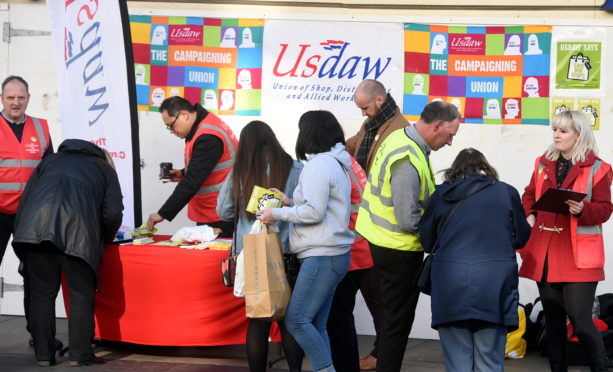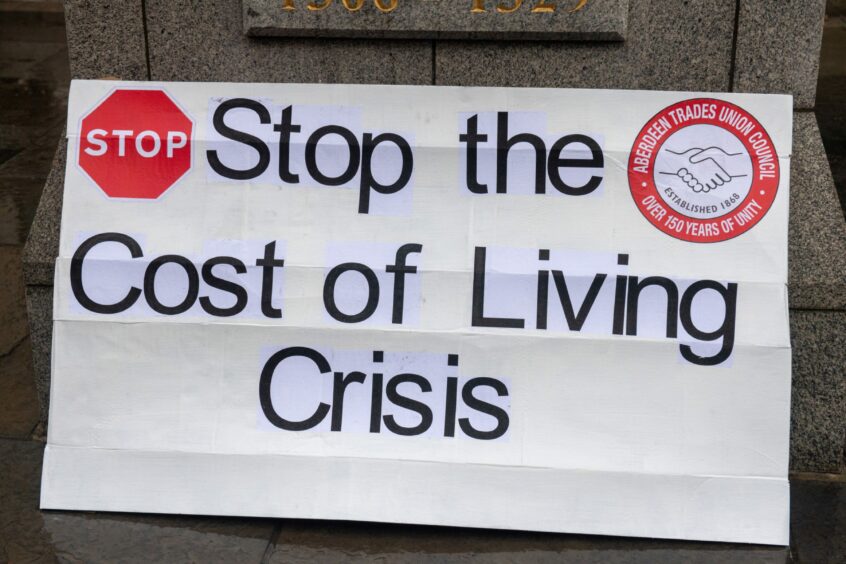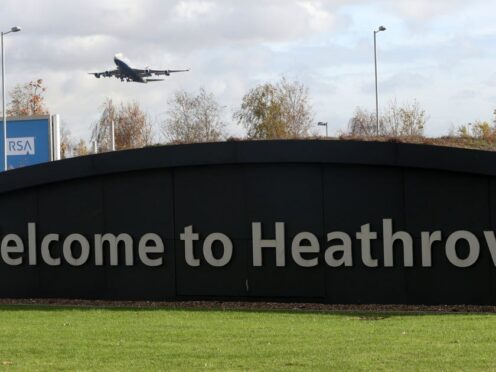Trade union campaigners will be taking to streets of Aberdeen this weekend to protest the effects of the cost of living crisis, as new research shows one in four retail workers are forced to skip meals to pay bills.
The Union of Shop Distributive and Allied Workers (Usdaw) is calling on the government to take action and increase the minimum wage rate.
Members of the retail trade union will be campaigning on Aberdeen’s George Street this weekend.
The action comes following a survey of more than 5,500 retail staff which found one in four are missing meals every month to be able to pay their bills, an increase from one in 20 last year.
The survey also found spiralling petrol prices and travel costs have impacted the ability to get to work for nearly half of respondents.
Members feeling the pressure
The union shared some of the comments made during their survey highlighting the difficulties people are facing following fresh warnings the UK is on course for 13% inflation this year.
“It can be a decision between fuel/heating/pet food and whether I have a proper meal,” said one respondent.
“Should not have to worry about things like this in this day and age.”
A 29-year-old retail worker said: “Right now I’m struggling mentally with rising prices and four young dependants to feed, clothe and keep a roof over their heads.
“I fight my mental health every day so I can make sure my kids can’t see me struggle.
“I often skip meals to make sure I have enough cash left to make sure they have enough snacks and drinks for school break.”
Now Usdaw wants a new deal for workers which includes a minimum wage of at least £12 per hour as a step towards £15 for all workers, ending youth rates.
And a minimum contract of 16 hours per week, for everyone who wants it, that reflects normal hours worked and a ban on zero-hour contracts.
‘Heart-breaking testimonies’
Usdaw general secretary Paddy Lillis said: “It is heart-breaking to hear these testimonies from Scottish workers who are in the main key workers that we rely on for essential services.
“Many respondents talked of how increased fuel prices were leading them to cut down on shifts, to ask for a transfer to a store closer to home or even to consider leaving work altogether.
“Worryingly, cutting down on food and skipping meals was also a common theme, as well as taking steps to reduce non-work related travel to save on fuel costs, such as visiting family or pursuing leisure activities.
“These are the very real experiences of essential workers who were clapped during the pandemic and now seem to be forgotten.
“The Government has offered only sticking plasters that go nowhere near covering rising prices and bills, so there needs to be significant increases in minimum wage rates and fundamental reforms to end insecure work.
The Government has offered only sticking plasters that go nowhere near covering rising prices and bills.”
— Usdaw general secretary Paddy Lillis
“Usdaw is calling for a new deal for workers, with minimum wage rates of at least £12 per hour as a step towards £15 for all workers.
“The pandemic clearly demonstrated just how reliant the country is on the lowest paid workers, so if we are to truly ‘build back better’ surely these essential workers deserve the dignity of decent pay.”
Protests will also take place in Edinburgh and Glasgow.











